外研版六年级下册英语第三单元课文笔记
六下英语第三单元知识点
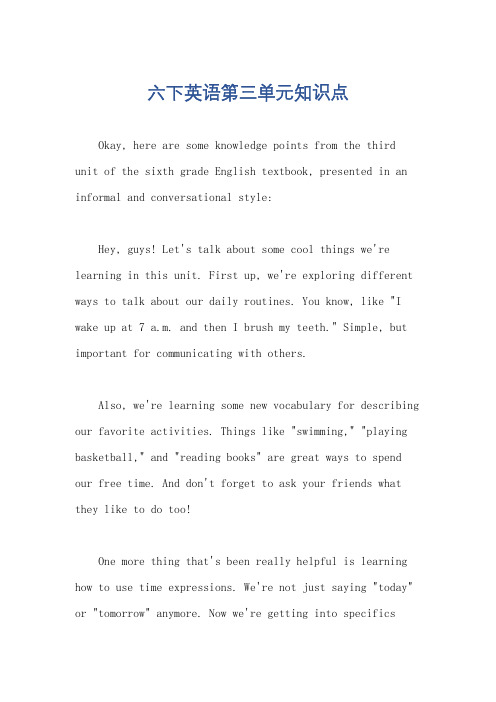
六下英语第三单元知识点Okay, here are some knowledge points from the thirdunit of the sixth grade English textbook, presented in an informal and conversational style:Hey, guys! Let's talk about some cool things we're learning in this unit. First up, we're exploring different ways to talk about our daily routines. You know, like "I wake up at 7 a.m. and then I brush my teeth." Simple, but important for communicating with others.Also, we're learning some new vocabulary for describing our favorite activities. Things like "swimming," "playing basketball," and "reading books" are great ways to spend our free time. And don't forget to ask your friends what they like to do too!One more thing that's been really helpful is learning how to use time expressions. We're not just saying "today" or "tomorrow" anymore. Now we're getting into specificslike "next week" or "in two days." It's like we're planning our lives with precision!Oh, and don't forget about the weather. We'repracticing how to describe different types of weather in English. Whether it's sunny, rainy, or snowy, we're ready to talk about it. After all, the weather is always a great topic for conversation.Lastly, we're learning how to express our feelings and emotions in English. It's not just about saying "I'm happy" or "I'm sad." We're diving deeper into things like "I'm excited about the trip" or "I'm nervous about the test.。
外研版(三起)小学英语六年级下册Module 3知识点汇总
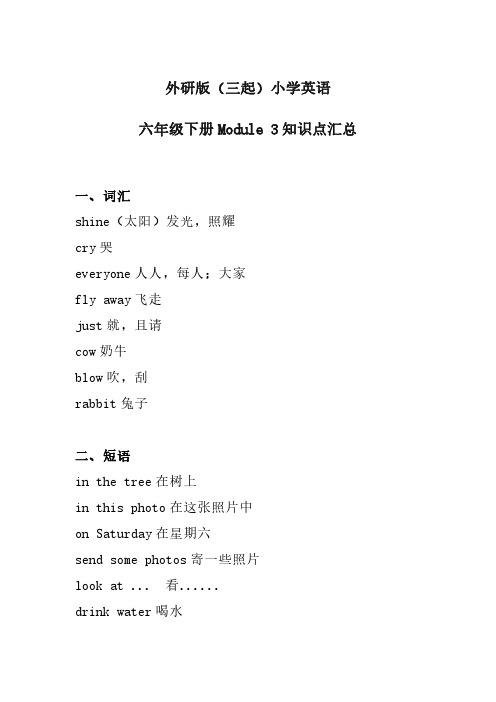
外研版(三起)小学英语六年级下册Module3知识点汇总一、词汇shine(太阳)发光,照耀cry哭everyone人人,每人;大家fly away飞走just就,且请cow奶牛blow吹,刮rabbit兔子二、短语in the tree在树上in this photo在这张照片中on Saturday在星期六send some photos寄一些照片look at...看......drink water喝水三、句子1.Please write to me soon.请尽快给我写信。
2.I had a very interesting day on Saturday.星期六我度过了有趣的一天。
3.The birds are singing in the tree.鸟在树上唱歌。
4.In this photo,it’s starting to rain and birds are flying away.在这张照片中,开始下雨了,鸟飞走了。
5.—What are you doing?你正在做什么?—I’m cleaning my room.我正在打扫我的房间。
6.We are having a lovely time!我们度过了快乐的一天!四、句型结构询问你正在做什么—What are you doing?—I’m+动词-ing+其他.eg:—What are you doing?你正在做什么?—I’m listen to music.我正在听音乐。
—What are you doing?你正在做什么?—I’m sweeping the floor.我正在扫地。
六年级下册英语Unit 3单元知识梳理(1)

六年级下册单元知识点第三单元四会单词:watch—watched 看wash—washed 洗clean—cleaned 打扫play—played玩visit—visited 看望do—did last weekend上一个周末go—went去go to a park—went to a park 去公园go swimming—went swimming 去游泳go fishing—went fishing去钓鱼read—read 读go hiking—went hiking 去郊游四会句型:What did you do last weekend? 你上个周末干什么了?I played football. 我踢足球了。
Did you read books? 你读书了吗?Yes, I did.是的,我读了。
No, I didn’t. 不,我没有。
应该掌握的知识点:1、关于一般过去时一般过去时态:表示过去某一时间所发生的动作或存在的状态。
谓语动词要用一般过去式。
经常与yesterday(昨天), last week(上周), last month(上个月), last year(去年), two months ago(两个月前), the day before yesterday(前天),in 1990 (在1990年), in those days (在那些日子里)等表示过去的时间状语连用。
如:I was born in 1990. (我出生在1990年)。
When did you go to the park? (你是什么时候去的公园)。
I went to the park last week. (我是上周去的公园)在上面的句子中第一句属于be动词的一般过去时态;第二句和第三句属于实义动词的一般过去时态。
(1)Be 动词的一般过去时态在没有实义动词的句子中使用be动词,am is 的过去式为was; are 的过去式为were.构成:肯定句:主语+was (were) +宾语如:I was late yesterday. (昨天我迟到了。
外研社小学英语六年级unit3知识点归纳
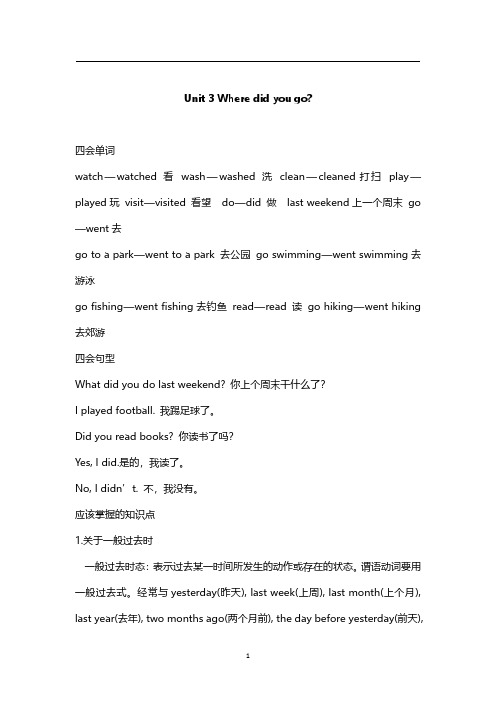
Unit3Where did you go?四会单词watch—watched看wash—washed洗clean—cleaned打扫play—played玩visit—visited看望do—did做last weekend上一个周末go —went去go to a park—went to a park去公园go swimming—went swimming去游泳go fishing—went fishing去钓鱼read—read读go hiking—went hiking 去郊游四会句型What did you do last weekend?你上个周末干什么了?I played football.我踢足球了。
Did you read books?你读书了吗?Yes,I did.是的,我读了。
No,I didn’t.不,我没有。
应该掌握的知识点1.关于一般过去时一般过去时态:表示过去某一时间所发生的动作或存在的状态。
谓语动词要用一般过去式。
经常与yesterday(昨天),last week(上周),last month(上个月), last year(去年),two months ago(两个月前),the day before yesterday(前天),in1990(在1990年),in those days(在那些日子里)等表示过去的时间状语连用。
如:I was born in1990.(我出生在1990年)。
When did you go to the park?(你是什么时候去的公园)。
I went to the park last week.(我是上周去的公园)在上面的句子中第一句属于be动词的一般过去时态;第二句和第三句属于实义动词的一般过去时态。
(1)be动词的一般过去时态在没有实义动词的句子中使用be动词,am is的过去式为was;are的过去式为were.构成:肯定句:主语+was(were)+宾语如:I was late yesterday.(昨天我迟到了。
六年级英语下册第三单元知识点和课文翻译
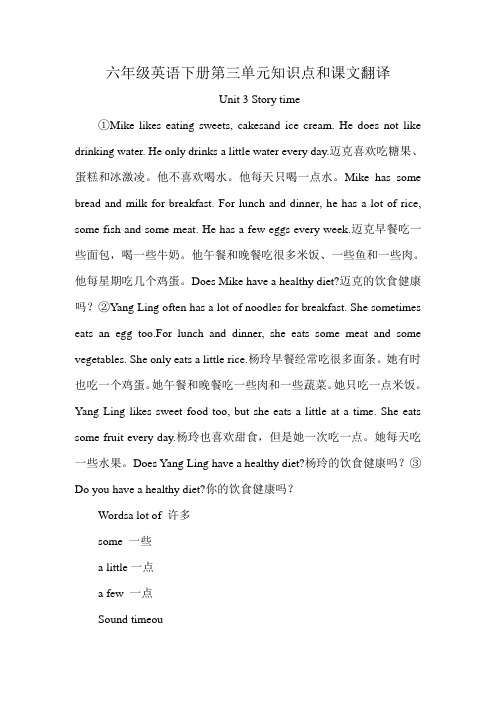
六年级英语下册第三单元知识点和课文翻译Unit 3 Story time①Mike likes eating sweets, cakesand ice cream. He does not like drinking water. He only drinks a little water every day.迈克喜欢吃糖果、蛋糕和冰激凌。
他不喜欢喝水。
他每天只喝一点水。
Mike has some bread and milk for breakfast. For lunch and dinner, he has a lot of rice, some fish and some meat. He has a few eggs every week.迈克早餐吃一些面包,喝一些牛奶。
他午餐和晚餐吃很多米饭、一些鱼和一些肉。
他每星期吃几个鸡蛋。
Does Mike have a healthy diet?迈克的饮食健康吗?②Yang Ling often has a lot of noodles for breakfast. She sometimes eats an egg too.For lunch and dinner, she eats some meat and some vegetables. She only eats a little rice.杨玲早餐经常吃很多面条。
她有时也吃一个鸡蛋。
她午餐和晚餐吃一些肉和一些蔬菜。
她只吃一点米饭。
Yang Ling likes sweet food too, but she eats a little at a time. She eats some fruit every day.杨玲也喜欢甜食,但是她一次吃一点。
她每天吃一些水果。
Does Yang Ling have a healthy diet?杨玲的饮食健康吗?③Do you have a healthy diet?你的饮食健康吗?Wordsa lot of 许多some 一些a little 一点a few 一点Sound timeouabout 大约house 房子mouth 嘴巴out 出去shout 喊,叫Mrs Li shouts, 李太太大声喊,“Get out! Get out!”滚!滚!There’s a little mouse 有一只小老鼠。
六年级下册英语外研版m2课堂笔记
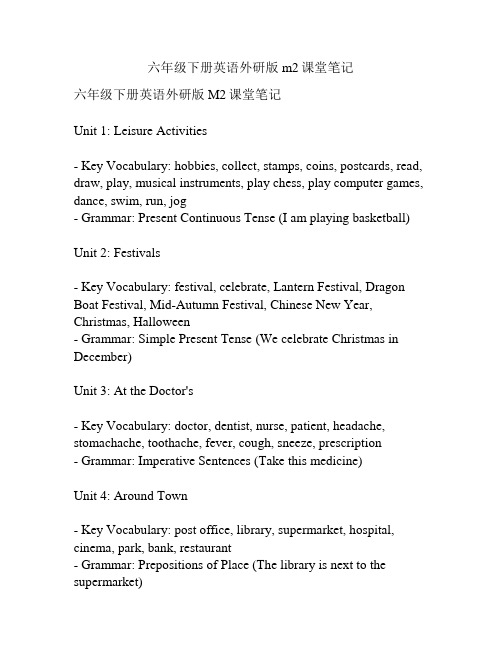
六年级下册英语外研版m2课堂笔记六年级下册英语外研版M2课堂笔记Unit 1: Leisure Activities- Key Vocabulary: hobbies, collect, stamps, coins, postcards, read, draw, play, musical instruments, play chess, play computer games, dance, swim, run, jog- Grammar: Present Continuous Tense (I am playing basketball) Unit 2: Festivals- Key Vocabulary: festival, celebrate, Lantern Festival, Dragon Boat Festival, Mid-Autumn Festival, Chinese New Year, Christmas, Halloween- Grammar: Simple Present Tense (We celebrate Christmas in December)Unit 3: At the Doctor's- Key Vocabulary: doctor, dentist, nurse, patient, headache, stomachache, toothache, fever, cough, sneeze, prescription- Grammar: Imperative Sentences (Take this medicine)Unit 4: Around Town- Key Vocabulary: post office, library, supermarket, hospital, cinema, park, bank, restaurant- Grammar: Prepositions of Place (The library is next to the supermarket)Unit 5: Inventions and Innovations- Key Vocabulary: invention, telephone, computer, internet, printer, television, camera, car, airplane- Grammar: Past Tense (Thomas Edison invented the telephone) Unit 6: Environmental Protection- Key Vocabulary: environment, pollution, recycle, save, conserve, waste, energy, water, garbage- Grammar: Modal Verbs (We should recycle paper)Unit 7: Story Time- Key Vocabulary: story, character, plot, setting, narrator, fairy tale, fable- Grammar: Past Continuous Tense (He was reading a book when the phone rang)Unit 8: Sports- Key Vocabulary: basketball, football, tennis, volleyball, swimming, gymnastics, skating, cycling- Grammar: Comparatives (Basketball is more popular than tennis) Unit 9: World Geography- Key Vocabulary: continent, country, capital, landmark, population- Grammar: Present Perfect Tense (I have visited London)Unit 10: Jobs- Key Vocabulary: job, doctor, teacher, engineer, chef, firefighter, police officer, pilot- Grammar: Future Tense (I will be a doctor in the future) These are the main points and vocabulary covered in the M2 textbook of the Grade 6 English course.。
六年级下册英语外研版课堂笔记
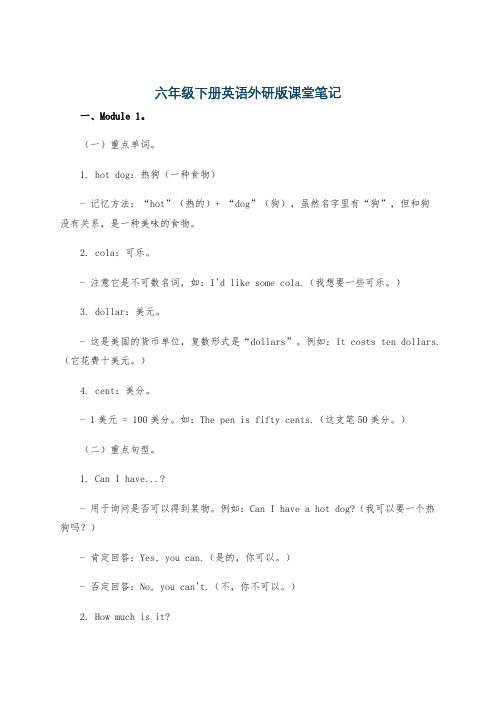
六年级下册英语外研版课堂笔记一、Module 1。
(一)重点单词。
1. hot dog:热狗(一种食物)- 记忆方法:“hot”(热的)+ “dog”(狗),虽然名字里有“狗”,但和狗没有关系,是一种美味的食物。
2. cola:可乐。
- 注意它是不可数名词,如:I'd like some cola.(我想要一些可乐。
)3. dollar:美元。
- 这是美国的货币单位,复数形式是“dollars”。
例如:It costs ten dollars.(它花费十美元。
)4. cent:美分。
- 1美元 = 100美分。
如:The pen is fifty cents.(这支笔50美分。
)(二)重点句型。
1. Can I have...?- 用于询问是否可以得到某物。
例如:Can I have a hot dog?(我可以要一个热狗吗?)- 肯定回答:Yes, you can.(是的,你可以。
)- 否定回答:No, you can't.(不,你不可以。
)2. How much is it?- 用来询问物品的价格。
例如:How much is the cola?(可乐多少钱?)- 回答:It's...(它是……),后面可以接具体的价格,如:It's three dollars.(它是三美元。
)二、Module 2。
(一)重点单词。
1. duck:鸭子。
- 复数形式是“ducks”。
可以说:There are some ducks in the pond.(池塘里有一些鸭子。
)2. noisy:吵闹的。
- 形容词,用来形容环境或声音很吵闹。
例如:The market is noisy.(市场很吵闹。
)3. peace:和平;太平。
- 例如:We all hope for world peace.(我们都希望世界和平。
)4. wide:宽的。
- 反义词是“narrow”(窄的)。
外研版六年级英语下册M3知识点
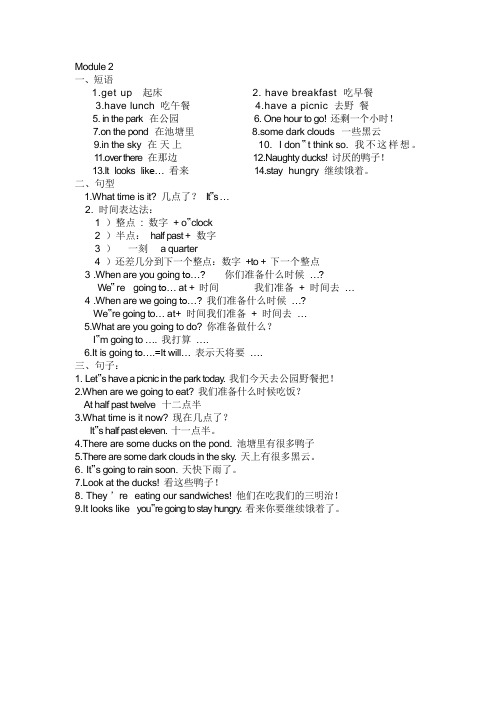
Module 2一、短语1.get up 起床2. have breakfast 吃早餐3.have lunch 吃午餐4.have a picnic 去野餐5. in the park 在公园6. One hour to go! 还剩一个小时!7.on the pond 在池塘里8.some dark clouds 一些黑云9.in the sky 在天上10. I don‟t think so. 我不这样想。
11.over there 在那边12.Naughty ducks! 讨厌的鸭子!13.It looks l ike… 看来14.stay hungry 继续饿着。
二、句型1.What time is it? 几点了?It‟s …2. 时间表达法:1 )整点: 数字+ o‟clock2 )半点:half past + 数字3 )一刻 a quarter4 )还差几分到下一个整点:数字+to + 下一个整点3 .When are you going to…? 你们准备什么时候…?W e‟ re going to… at + 时间我们准备+ 时间去…4 .When are we going to…? 我们准备什么时候…?We‟re going to… at+ 时间我们准备+ 时间去…5.What are you going to do? 你准备做什么?I‟m going to …. 我打算….6.It is going to….=It will… 表示天将要….三、句子:1. Let‟s have a picnic in the park today. 我们今天去公园野餐把!2.When are we going to eat? 我们准备什么时候吃饭?At half past twelve 十二点半3.What time is it now? 现在几点了?It‟s half past eleven. 十一点半。
- 1、下载文档前请自行甄别文档内容的完整性,平台不提供额外的编辑、内容补充、找答案等附加服务。
- 2、"仅部分预览"的文档,不可在线预览部分如存在完整性等问题,可反馈申请退款(可完整预览的文档不适用该条件!)。
- 3、如文档侵犯您的权益,请联系客服反馈,我们会尽快为您处理(人工客服工作时间:9:00-18:30)。
第一部分:Lesson One
1. 课文标题:What do you do on Sundays?
2. 课文内容概要:Jack's d本人ly routine on Sundays.
3. 重点词汇:Sunday, breakfast, watch, TV, go, supermarket.
4. 课文难点:陈述句的肯定和否定形式。
5. 学习重点:了解Jack的周日活动,能够用英语描述自己的周日活动。
6. 课文细节:Jack在周日早上吃早餐,上午看电视,下午去超市。
他
喜欢周日。
第二部分:Lesson Two
1. 课文标题:What's your favourite day?
2. 课文内容概要:同学们喜欢的日子。
3. 重点词汇:favourite, day, Monday, my favourite day is…。
4. 课文难点:询问和回答喜欢的日子。
5. 学习重点:了解同学们喜欢的日子,能够用英语表达自己喜欢的日子。
6. 课文细节:同学们喜欢不同的日子,有的喜欢周一,有的喜欢周五,有的喜欢周日。
第三部分:Lesson Three
1. 课文标题:I go to school by bike.
2. 课文内容概要:同学们上学的方式。
3. 重点词汇:by, bus, bike, foot.
4. 课文难点:介词by的用法。
5. 学习重点:了解同学们上学的方式,能够用英语表达自己上学的方式。
6. 课文细节:有的同学坐公交车上学,有的同学骑自行车上学,还有
的同学步行上学。
第四部分:Lesson Four
1. 课文标题:How do you go to the zoo?
2. 课文内容概要:同学们去动物园的方式。
3. 重点词汇:zoo, how, go, there.
4. 课文难点:疑问词how的用法。
5. 学习重点:了解同学们去动物园的方式,能够用英语表达自己去动物园的方式。
6. 课文细节:同学们去动物园的方式有很多种,有的坐公交车,有的骑自行车,有的坐地铁。
第五部分:Lesson Five
1. 课文标题:Where is it?
2. 课文内容概要:同学们家附近的地点。
3. 重点词汇:where, supermarket, park, library, cinema.
4. 课文难点:询问和回答地点位置。
5. 学习重点:了解同学们家附近的地点,能够用英语询问和回答地点位置。
6. 课文细节:同学们家附近有超市、公园、图书馆和电影院等地方,他们可以步行到这些地方。
结束语:通过学习本单元的课文,我们不仅能掌握日常活动和交通方式的英语表达,还能了解同学们喜欢的日子和家附近的地点。
希望同学们能够在课后多加练习,提高自己的英语口语表达能力。
